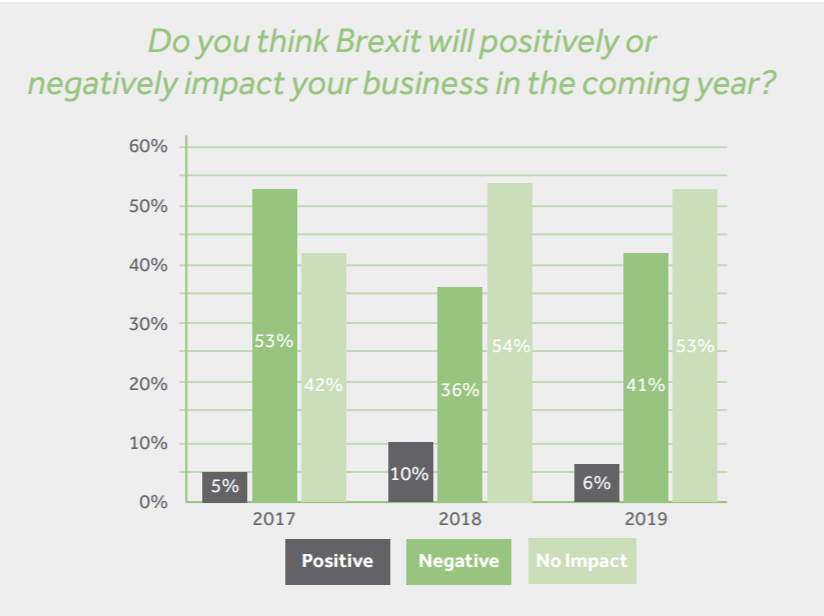Brexit & The Training Industry: What To Expect

What impact will Brexit have on the training industry? We’re here to try and answer that very question. Four years on, I think it's fair to say we all expected a much clearer picture by this point of precisely what Brexit would mean for UK businesses. Below, we've addressed some key topics that each have the potential to impact the training industry, following our withdrawal.
So, where are we at?
The UK voted to leave the European Union all the way back in mid-2016. As of January 2020, the UK formally left the EU and has now completed the transition period as of December 2020.
We're interested in uncovering precisely what's in store for the likes of training providers, higher education institutions and internal training teams as we delve further in to 2021.
We've been tracking the thoughts and feelings of training professionals on Brexit in our annual benchmark report for multiple years now. From the graph below, it's pretty evident that little is changing year-on-year in terms of how training professionals feel about Brexit. Perhaps the key takeaway from the data below is that over half of training professionals still felt their training business would not be affected by our departure from the EU during 2019.

Cautious Behaviour
Perhaps the most significant and likely occurrence to expect following the transition period is cautious behaviour from British consumers. Experienced most notably during the global financial crisis of 2008, cautious behaviour is our natural reaction as humans to uncertainty.
While this is hard to quantify in terms of business impact, history suggests this behaviour often involves reduced spending, and, unfortunately, learning and development and training budgets are typically areas that are hit the hardest, often seen as discretionary.
With Brexit thus far, however, we’ve seen a different story unfold. In a CIPD study from 2018, it was found that more than half of respondents (55%) said that leaving the EU has had no impact on their training & skills development investment, with just 20% saying it had caused them to reduce investment.
Furthermore, a study by Growth from Knowledge conducted in 2019 suggested a ‘cautiously increasing optimism’ among British consumers, and that it’s not Brexit directly that is feared, rather the uncertainty and ambiguity that still exists around exactly what deal we will negotiate.
Recruitment Reshape
There is a reasonable chance that Brexit may impact the UK’s ability to compete within the recruitment market. For UK businesses that are on the lookout for new staff, it's likely to become more appealing (and cost effective) to invest in the talent already within the business. This is likely to lead to both the development of employee talent programs and create new opportunities for commercial training providers.
There’s also evidence of multi-national businesses moving their company-base abroad, some of the most notable including the likes of Dyson, HSBC and Barclays. In fact, one study conducted by IoD found as many as a third of UK businesses are planning to relocate abroad due to Brexit. This in turn will have ramifications for UK employment, with a number of employees being forced to find other work, leading to increasing competition in the job market. Particularly for HE and FE institutions, but also for providers running short courses, this could create opportunity. As jobseekers look for new ways to upskill, retrain and develop in order to increase their employability, demand for learning and development initiatives will increase.
As the UK is likely to experience a drop in foreign workers, (particularly in sectors that are reliant on training and compliance) there’s reason to suggest the next couple of years could be an ideal time for recruiting, onboarding and upskilling UK based workers.
Sterling Volatility
The exchange rate of the sterling has been scrutinised with a greater focus than ever since the announcement of Brexit – and for good reason. While a depreciating currency is widely considered to be bad for the economy due to inflation, it can also make our goods and services more competitive and appealing to foreign buyers and investors.
Due to the unexpected digital pivot during COVID-19, many commercial, UK based training providers now operate on the global market through online learning offerings. If the sterling is to devalue against key currencies such as the US dollar and the euro, it may not be all such a bad thing for these businesses.
Since the Brexit vote was won, the pound sterling depreciated rapidly against the euro up until 2017, where it has remained fairly constant ever since. Depending on precisely what deal is agreed, this could subject to fluctuation within the coming months.
On the topic of sterling, it’s also worth considering the national minimum wage. Despite this not directly relating to Brexit, the upwards trend of the base line wage employers must pay employees supports a compelling case for improving the productivity of existing staff instead of further recruitment. What is the best way to do this? Training!
Legislative Change
It is predicted as much as half of our legislation in the UK is determined by EU regulations. Looking forward, with it now within the UK government’s control to determine this legislation hence-forth, some suspect it may mean removing some of the ‘red-tape’ that currently exists. Whatever the outcome, there is likely to be an avenue for training providers that offer compliance training to increase their operations and to recertify mandatory training under new legislation.
Interestingly, compliance training makes up the vast majority of eLearning programs - from health & safety and risk management to information security and data protection. For eLearning providers in particular, this could be a great opportunity to capitalise on.
Loss of EU Initiatives
It’s important we recognise the impact certain EU schemes have had on the UK training industry, most notably through the initiatives Erasmus+ scheme and the European Social Fund. The basis of such initiatives focused on allowing EU nationals to work, train and gain valuable experience abroad.
Of course, this scheme involved ongoing contribution from EU members, therefore it’s not unreasonable to think the UK can invest in similar schemes through resource reallocation. It’s also a discussion that’s likely to form part of the withdrawal agreement. It's thought Erasmus+ may indeed continue, if negotiations work in the UK’s favour.
Lessons From COVID-19
We have learnt a lot from the COVID-19 pandemic in terms of how the training industry has responded to change and uncertainty. Training Industry Inc. have been running surveys throughout COVID-19 and have found that L&D professionals are continuing to increase spend across a number of different areas, most of these related to investment in technology such as management systems and interactive courses. This is to such an extent, that in the study, despite budgets changing for 58% of respondents throughout COVID, 61% are actually spending more than they did before the pandemic.
A key lesson we’ve learnt from COVID-19 is that the training industry is agile and can effectively respond to change. While 2020’s challenges have exposed weaknesses for some, it’s provided opportunity for others. This pro-active, innovative state we’ve been forced to adopt should serve us well in both the challenges and chances of post-Brexit Britain.
Conclusion
When we account for all the factors above, there’s a number of variables that will contribute to how Brexit will impact the UK training industry. What we know so far is - online learning initiatives, as they have during COVID-19, are likely to prove pivotal in a time of a depressed economy and an increasing need of compliance training. Despite learning and development historically having a disappointing record of being overlooked and neglected during times of downturn, through upskilling opportunities, a favourable currency to foreign buyers and domestic controlled regulation, there is certainly hope on the horizon.
How do you see Brexit impacting the training industry? Let us know in the comments!


